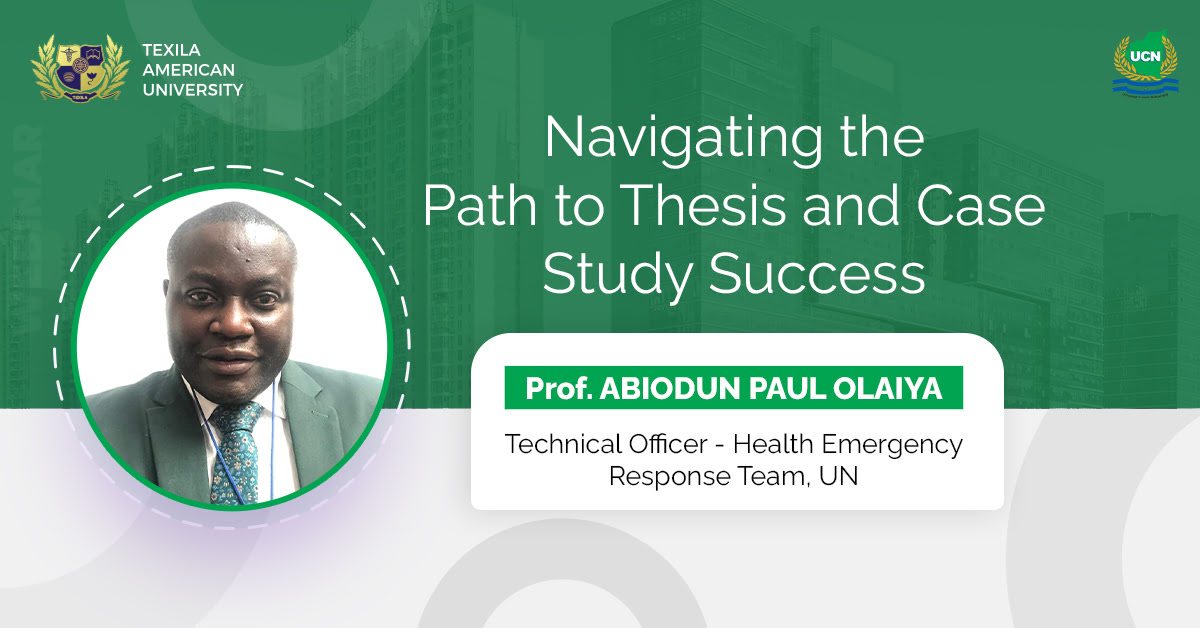Blog Summary
Embarking on the journey of writing a thesis or dissertation or delving into case studies can be daunting and exhilarating for doctoral and MPH students. These academic endeavours are crucial milestones in one’s educational journey, showcasing mastery of subject matter, independent research skills, and critical thinking abilities. In this comprehensive guide, we will navigate through the intricacies of each component, offering invaluable insights and practical tips to ensure success in your academic pursuits.
Understanding Thesis and Dissertation Distinctions
At the outset, grasping the nuances between a thesis and a dissertation is imperative. While the terms are often used interchangeably, they differ in scope, depth, and purpose.
A thesis, commonly associated with a master’s degree program, typically focuses on a narrower research topic or question. It demonstrates the student’s mastery of the subject matter and ability to conduct independent research within a limited scope. The examination process for a thesis may involve evaluation by a committee of faculty members, with the students often required to defend their work orally.

On the other hand, a doctoral dissertation involves more extensive research and a significant contribution to the field. It aims to make an original and substantial contribution to knowledge, often by advancing or challenging existing theories or practices. A dissertation typically requires a more thorough examination process. It usually finishes with a public defence in which the student stands before an expert committee to present and defend their research findings.
Exploring Diverse Types of Theses and Dissertations
The landscape of thesis and dissertation types is vast and varied, catering to diverse research interests and academic disciplines.
- Traditional Research Thesis/Dissertation: This is the most prevalent kind, in which students carry out original research, scrutinize information, and formatively communicate their conclusions. An introduction, literature review, methodology, findings, discussion, and conclusion are usually included.
- Literature Review Thesis/Dissertation: This type focuses on reviewing and synthesizing existing literature on a specific research topic. Students critically analyze and evaluate a body of literature to identify key themes, theories, and gaps in knowledge.
- Case Study Thesis/Dissertation: Involves an in-depth analysis of a specific case or set of cases. Students examine real-life situations, organizations, or phenomena to understand particular issues or challenges.
- Practice-Based Thesis/Dissertation: Commonly pursued in creative fields, students engage in a creative practice or project and provide a written component reflecting on the creative process and critical analysis of the work produced.
- Systematic Review/Meta-analysis Thesis/Dissertation: Involves a comprehensive and systematic analysis of existing research studies on a specific topic. Students identify relevant studies, assess their quality, and synthesize the findings to draw conclusions and make recommendations.
Crafting Your Title and Topic Selection
The journey towards a compelling thesis or dissertation begins with meticulous title and topic selection.
- Get a mentor/expert in your field: Seek assistance from a mentor or knowledgeable person who can offer insightful commentary and direction throughout the research process.
- Understand the Purpose: Contemplate the rationale behind your research endeavours and ascertain your dissertation’s or thesis’s primary emphasis or aim.
- Research Background: Undertake an exhaustive literature review to comprehensively understand the current body of research and detect any deficiencies or unresolved inquiries within the discipline.
- Clarity and Specificity: Ensure that the title unambiguously communicates the subject matter and extent of the investigation, providing sufficient specificity to enable the reader to grasp the essence of the study at hand.
- Relevance and Significance: Opt for a title that is pertinent to the domain of your research and corresponds with contemporary developments or concerns within the field.
- Uniqueness and Originality: Strive to have a distinct title that embodies the core of your research, avoiding titles that are excessively generic or too similar to existing studies.
- Seek Feedback: It can be helpful to seek feedback from your advisor, peers, or other experts in your field to enhance your title.
Navigating the Research Process
As you delve into the research process, familiarize yourself with the major sections of a primary research paper. From the title page to references, each section plays a crucial role in presenting your findings cohesively and convincingly. Furthermore, ethical considerations and honesty in research conduct form the bedrock of academic integrity, ensuring your work upholds the highest standards of scholarship.
Mastering Case Studies: A Practical Approach
Mastering case studies requires a practical approach that combines analytical thinking with real-world problem-solving skills. By immersing oneself in diverse scenarios and contexts, students can better understand complex issues and how to address them effectively. Through case studies, learners are challenged to think critically, consider multiple perspectives, and make informed decisions based on available evidence.
This practical engagement fosters the development of essential skills such as communication, collaboration, and creativity. Furthermore, case studies provide a bridge between theoretical knowledge and practical application, allowing students to see the relevance of their learning in real-life situations. By grappling with authentic challenges, individuals can refine their problem-solving abilities and build confidence in their decision-making capabilities.
Adequate mastery of case studies involves thorough analysis, strategic planning, and adapting to changing circumstances. It requires a holistic approach that integrates theoretical frameworks with practical insights, resulting in well-rounded solutions to complex problems. Ultimately, mastering case studies empowers students to become proactive problem-solvers, equipped to navigate the complexities of their academic and professional endeavours with confidence and competence.
Conclusion: Empowering Academic Excellence
Navigating the path to thesis, dissertation, and case study success requires diligence, perseverance, and a strategic approach. By understanding the nuances of each component, harnessing mentorship, and embracing diverse research methodologies, you pave the way for academic excellence. As you embark on this transformative journey, remember that every challenge is an opportunity for growth, and every milestone is a testament to your scholarly endeavours. Here’s to mastering your academic pursuits and shaping the future of research and innovation.
With this comprehensive guide as your companion, embark on your academic journey with confidence, knowing that you have the knowledge and tools to excel in your thesis, dissertation, and case study endeavours.













